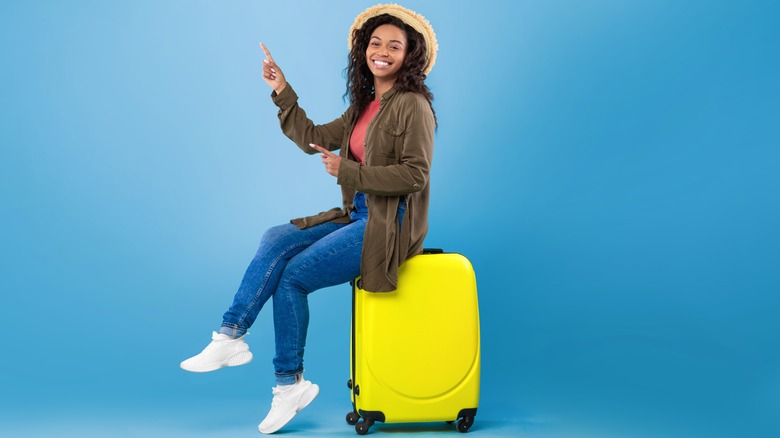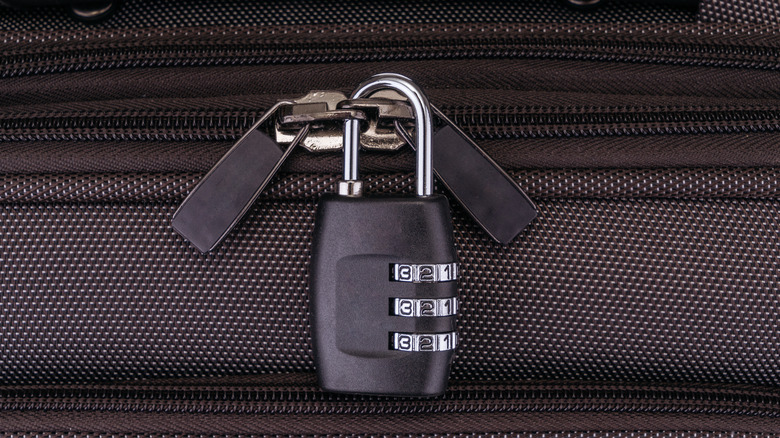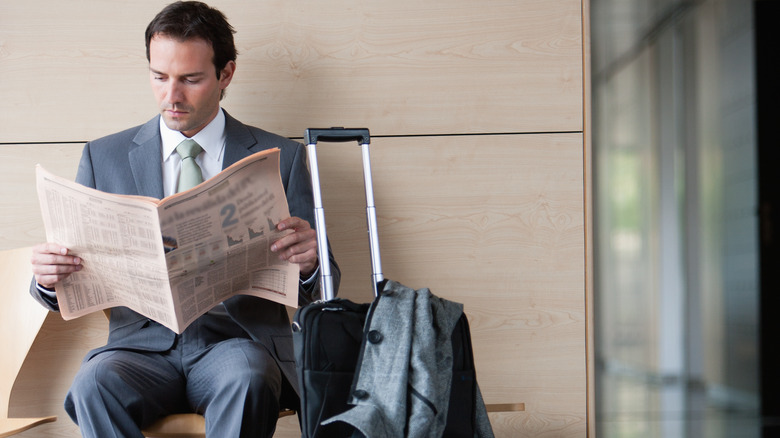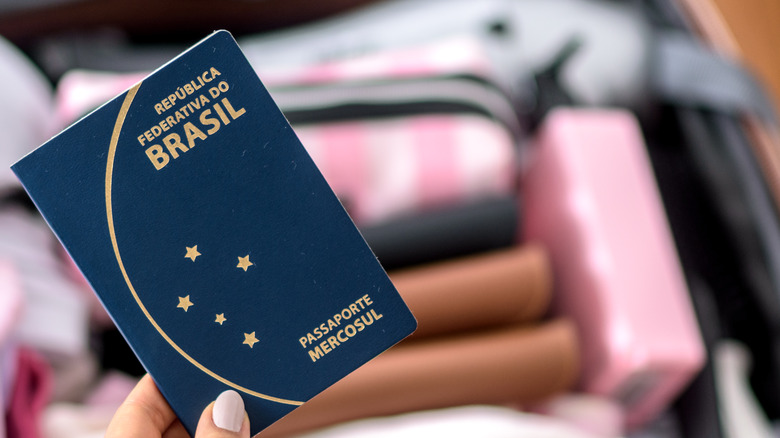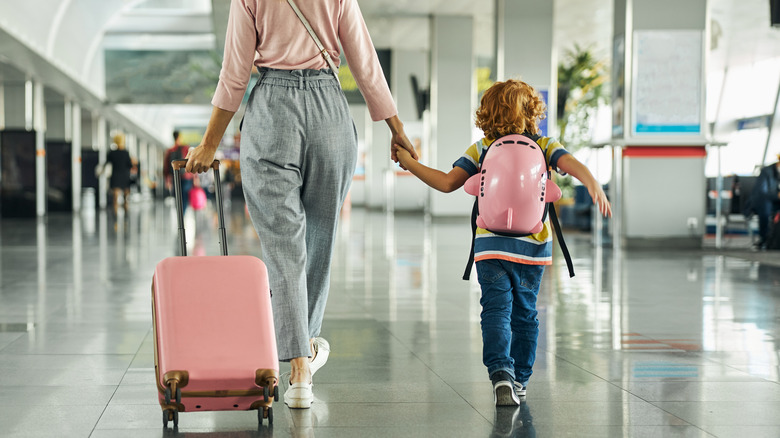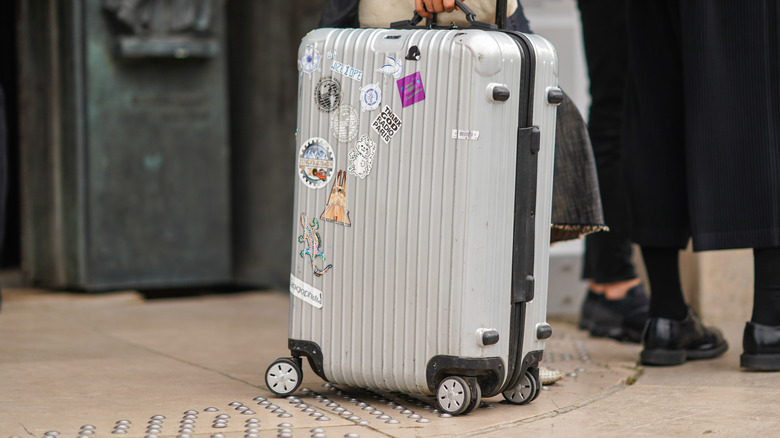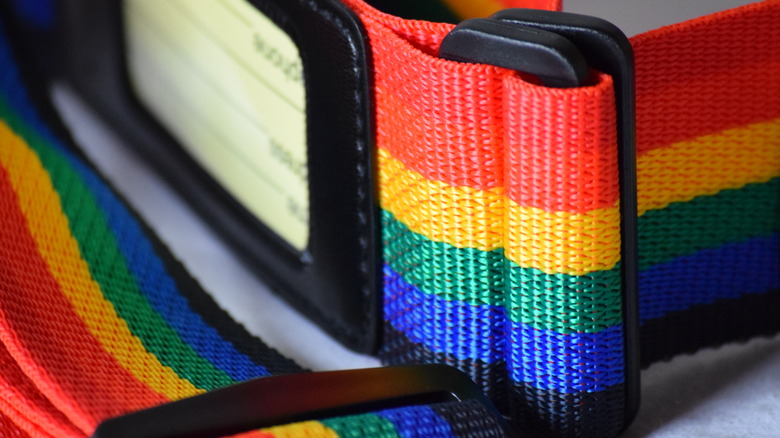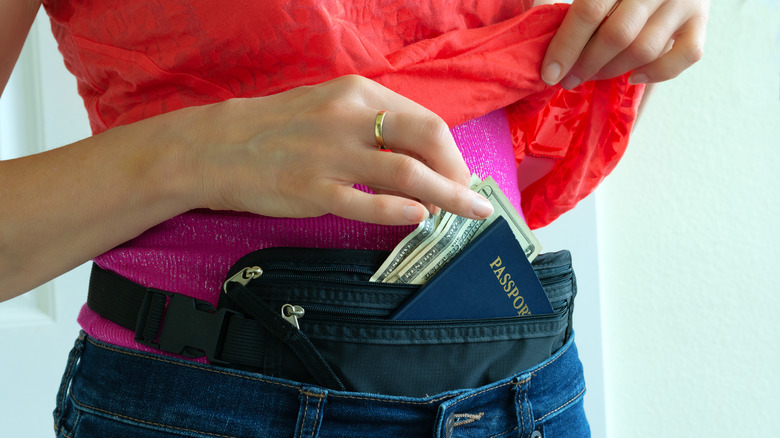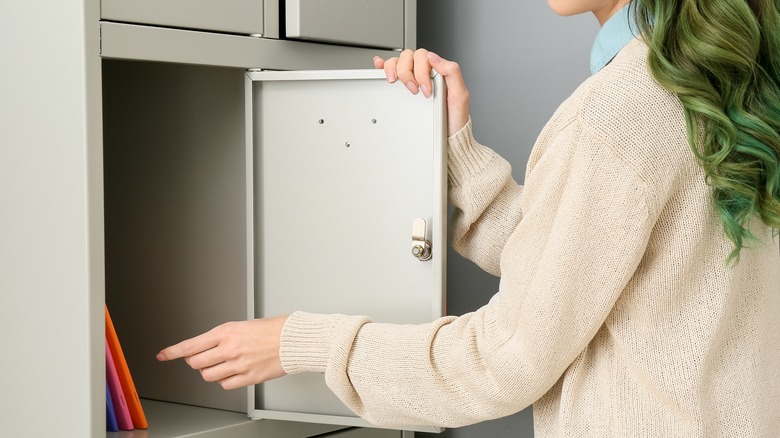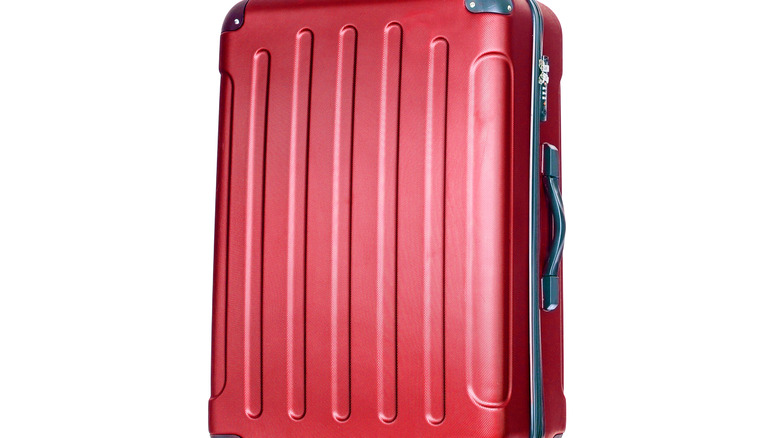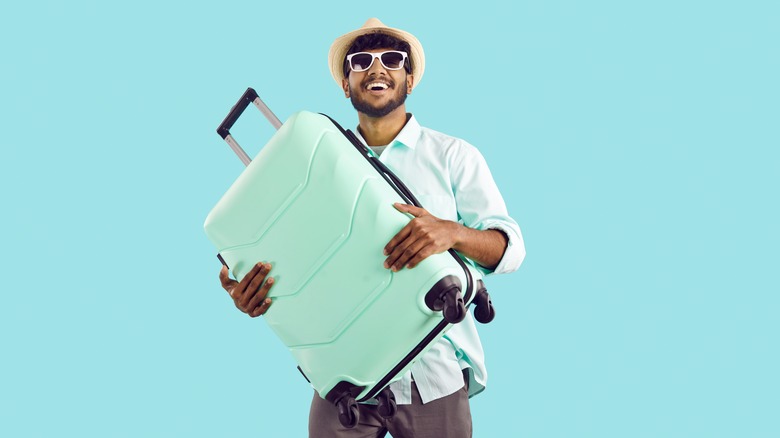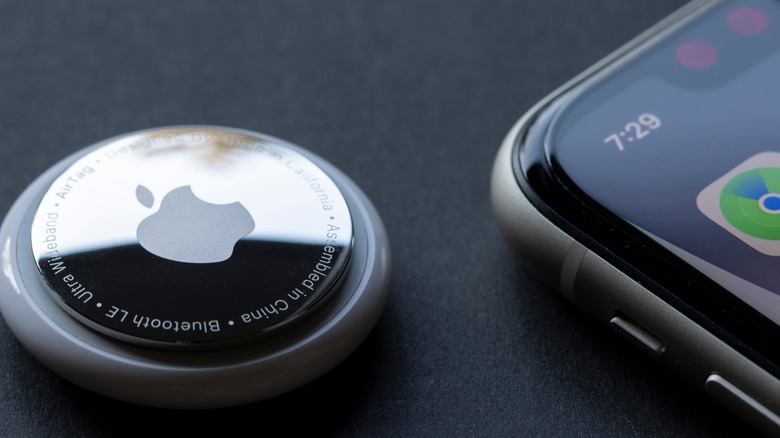Luggage Tips That Will Help Ease Your Mind While Traveling
Luggage loss has always been a concern for travelers, though the issue is becoming worse over time — not better. Of every 1,000 suitcases handled by major U.S. airlines, seven are lost. But that statistic only applies to airlines that are entrusted with your baggage and manage to lose it. That doesn't account for the bags that are stolen, misplaced, or left behind. The concern of having a bag lost because you get stuck on a layover is very real, and anyone who has made it to their final destination without their bags will understand that fear.
Beyond luggage being lost by the airlines, it's also possible for your suitcases to get swiped at baggage claim. Though it would be difficult to steal someone else's luggage right in front of them, it still happens. Some airports even go so far as to check the tag on your luggage as you head out of baggage claim to ensure that the right bag is with the right person. The number of identical bags you'll see in an airport on any given day certainly doesn't help.
Still, there are a lot of ways to keep your suitcases safe during your travels. Even just one or two of these tips could keep loss or theft far from your peaceful vacation thoughts. Plus, several of these tips are one-and-done adaptations that will keep your stuff safe for many trips to come.
Invest in quality luggage locks
It's been shown time and time again that TSA-approved luggage locks are an imperfect solution to luggage being tampered with. The locks are made to be secure against others, yet they're built in a way that TSA can access your bags with a master key if needed. That means that other people have ways of getting into the lock, too. Although a thief could finagle the locks open to get inside a suitcase, having the lock there will still manage to slow them down.
Locks can be purchased in a variety of colors, shapes, and varieties. Much like a bike lock, you set the combination yourself, so be sure it's something you can easily remember, even if you're on three hours of sleep for an early flight.
Though even non-criminal types can easily use a pick to open one of these locks in a matter of seconds, it's still better than nothing. Someone is bound to see a person trying to shimmy open a lock in a busy airport, right? Most likely. A good lock is still the best way to keep your bag closed against folks who don't need to be in it. They aren't perfect, but they get the job done.
Keep an eye on your bags
If you pay attention to the constant announcements at airports, they frequently include a message about keeping an eye on your belongings. Especially in busy airports, it is easy for someone to casually walk by, grab a suitcase and just keep walking. Always have an eye on your bags when in public. Don't leave your things unattended for any reason.
If you have a bag with you that isn't a suitcase and is easier to walk away with, consider utilizing what's around you to keep your things safe. Try looping your bag straps around opposite back corners of your chair if it is an option, that'll make it impossible for someone walking by to grab your bag and run because the straps are crisscrossing each other. Or if your bag is on the ground, put a chair leg through the strap hole so it's secured to your spot.
Be smart when packing
One of the best ways to prevent theft is to make things more difficult for would-be thieves. When you're packing, do so on the assumption that someone will have access to your luggage. That means packing valuables in unique places rather than storing them in easily accessible places. Consider hiding cash or jewelry inside bra cups, underneath clothes, or in interior pockets within the suitcase. Laying necklaces out in a shirt and then folding the shirt over itself is not just a good way to keep it safe but it should also keep your necklaces from tangling with one another.
You could also consider packing decoy objects like a fake hairbrush to hide your jewelry in. Any place that doesn't immediately come to mind for would-be thieves is the best place. You could even use a labeled laundry bag for valuables too –- just don't forget and put your dirty clothes in there on accident!
Get a hard-sided suitcase
When it comes to luggage types, travelers tend to live in one of two camps: hard-shell or soft-shell. Hard-shell suitcases do get noticeably more damaged than their fabric counterparts, but they're easier to clean. Soft-shell luggage can sometimes fit more items because it expands, but it can be slashed open. Both have their advantages and disadvantages though one thing is clear: Items in hard-shell suitcases are more secure.
The plastic-based hard-shell suitcases are durable and safe, though aluminum luggage is the most durable of all. These suitcases all offer metal bolts rather than zippers, which can help keep things secure. Hard-shell cases usually have integrated, built-in locks that are more secure than the add-on locks you can buy aftermarket. Also, because of the rigidity of hard-shell cases, these bags are more difficult for someone to rip open. You'll also lessen the risk of overpacking, which always helps. The hard-shelled suitcases make it pretty impossible to pack more than they can carry. Don't worry, you'll get used to it!
Give your suitcase a makeover
If you have a plain colored suitcase, it's still possible to make it your own! Consider covering it with stickers, for example. Anytime you go someplace new with your bag you could grab a vinyl, waterproof bumper sticker and slap it on. The stickers will stand out among the rest and serve as a fun souvenir holder. There are plenty of ways to make your luggage stand out from the rest, especially if it's a common color.
A few other simple ways to make your luggage stand outare to add unique luggage tags, use a brightly colored or patterned luggage strap, tie a ribbon to the handles of your bag, or even line the outside with washi tape. These steps can be taken with whatever suitcase you already have, which minimizes the cost of making your luggage more visible.
If you're on the lookout for new suitcases, the best thing you can do is purchase sturdy luggage in a bright color, a pattern, or a unique texture that will jump out at you. Plenty of companies have a range of colors and styles in their suitcases now, making getting a less common piece of luggage easier than ever before.
Get some luggage straps
One of the most versatile items travelers can have in their packing arsenal is the luggage strap. These handy straps keep your suitcase closed, can help with moving your bags around, can keep your bags together, or even identify your luggage from others around it. They're especially good for hard-shell bags because they can break if you stuff them too full – plus they're an excellent backup if you were to have a zipper bust in transit.
Cincha is one brand making luggage straps. They call their versions "travel belts," which is fitting since they're more accessories than suitcase hardware. Even though they're really nice looking, they're also very sturdy straps. The adjusters stay right in place, making them versatile for all kinds of luggage situations. Cincha can be a lifesaver for keeping bags together without a trolley strap (the fabric opening that keeps your bag hooked to your suitcase handle). Getting across an airport in a hurry with all your stuff isn't a worry with a trusty luggage strap.
Beyond keeping your stuff together or marking your suitcase as yours, luggage straps can also make it easier to lug your luggage. Especially for shorter folks, it can be nerve-wracking to grab a suitcase out of the overhead compartment because you're just a bit too short to get a good hold of the bag. A luggage strap can help stabilize the suitcase and lessen the likelihood that you'll whack someone with it or drop it while trying to get it down.
Keep valuables on you
Since nothing can truly prevent loss or theft while traveling, the best option you have is to keep your valuables on you at all times. It's advised by airlines to keep things like medications either in your carry-on or personal item so you have access to them, but the same should be considered for things like cash, jewelry, important documents, and anything else you absolutely need or consider valuable.
They might seem silly, but money belts and neck wallets are travel staples for a reason. Placing your valuables in a nontraditional place on your body is one of the best ways to keep someone from making off with your wallet when your back is turned. For ease of your own access, consider wearing the money belt over your shirt instead of under it to make for less awkward public situations.
Other kinds of hidden wallets include money socks, Storage Soles (shoes with hidden compartments), and even money bras. Beyond keeping your stuff safe, utilizing a variety of carrying methods for your valuables keeps room in your bags for your other belongings. Some of these hidden pouches can easily be used for other valuables beyond money, so keep that in mind while packing.
Be mindful of storage lockers or facilities
Applications like LuggageHero and Stasher have made it easier than ever to find places to store your luggage. Whether you have a long layover or can't check into your accommodation, lugging suitcases around can be a pain. While many options are out there thanks to the internet, it's still important to be careful. Be sure to pick somewhere with good reviews and plenty of information about them.
Remember that the companies will often have your back and getting any money back for locations that aren't cooperative should be easy. It's also a good idea to pay for them using a credit card so you can rely on your bank to fight for your refund with you if something goes wrong.
Around the world, some of the largest luggage storage options are the ones we've noted above as well as Nannybag, which has over 10,000 locations across 500 cities, Radical Storage with over 3,500 spots in more than 350 cities, and Bounce, which has over 1,300 locations in 350 cities. Take account of what storage facilities are available at your destination ahead of time, make a profile if needed, and do a little research on where the best places to store your stuff securely if you need it later.
Find frame case or zipperless suitcases
For the sake of safety, suitcase design seems to be going back in time to trunk eras. Several companies now sell zipperless or frame-case luggage that opens like briefcases. They're considered the safest suitcases around, with prices that match that claim. One of the reasons they are so secure is that the suitcases don't have zippers that can pop open, making them more impact resistant.
Like other hard-shell suitcases, frame case luggage has built-in TSA-approved combination locks that provide an additional layer of security. Two separate locks can even be built into each of the clasps that keep the suitcase closed. They're generally pretty light like other hard-shell suitcases while still being more durable than soft-shelled luggage. Additionally, where the zippers would be the suitcases come built with metal frames that have a whole other level of structural integrity for the frame case suitcase. They're still new and relatively more expensive than some of your other luggage options, but they're worth considering for their security value.
Utilize zip ties
It looks a bit silly, but a lot of travelers zip-tie parts of their suitcases to prevent theft. Whether you're zip-tying the zippers together so the suitcase can't be opened, or putting giant zip-ties around the body of the suitcase to make it harder to open, it's a cost-effective security measure. The Transportation Security Administration does allow zip ties on luggage because it's easy for them to cut the ties off if the bags need inspecting.
You could use zip-ties that match the color of whatever you're using them on to make them less conspicuous. For example, using black zip-ties for a black suitcase or clear ones for locking silver zippers together. You will still be able to see the zip-ties, though they'll be far less noticeable if you try to match the colors. Just be sure to check with the local authorities if you're traveling internationally to ensure that they're allowed at other airports outside of the United States.
Be a minimalist traveler
The best way to keep your luggage safe, particularly from being lost in transit, is to be a carry-on-only traveler. Only having a carry-on means no waiting around to check your bags in, waiting around to get them from baggage claim, or worrying that the airlines will lose them. Overall it's a much better way to travel. Once you become a carry-on-only traveler, I can personally attest that it'll become your favorite way to travel. You will never miss the hassle of checking a bag afterward.
Plus being a carry-on-only traveler tends to be cheaper. Many airlines allow at least one carry-on bag per passenger, whereas you'd have to pay for checked bags. Not having to pay for extra luggage means more money to have fun on your travels.
You may, every once in a while, get stuck gate-checking a bag because of an overbooked flight or if the plane runs out of overhead space. The way to avoid that situation is to gain loyalty status with the airline you're flying or use that airline's branded credit card to book your flight to get earlier boarding. If you board the plane sooner, the more likely it is that you'll have overhead space for your bag.
Use a tracking device
In the last few years, social media has been abuzz with folks advising others to place an AirTag or other tracking device inside their luggage before travel so they always know where their bag is. Folks have seen their suitcases go missing and end up in other countries, with their trackers as proof. But is it an advisable choice to use them to keep track of your bags?
Not all tracking devices are treated equally by the feds, so it's important to know what can fly and what can't. In order to be allowed to fly, the tracker must have less than 0.3 grams to its lithium battery and a Watt-hour rating of less than 2.7 Wh.
Using trackers can keep your mind at ease, especially if you're concerned about checked bags getting to the right place. The data might help you advocate getting your luggage back, though using them is no guarantee that they still won't go missing. Consider an off-brand tracker if you plan on keeping it in your luggage, that way if it does go missing you haven't spent a lot of money on tracking devices.
